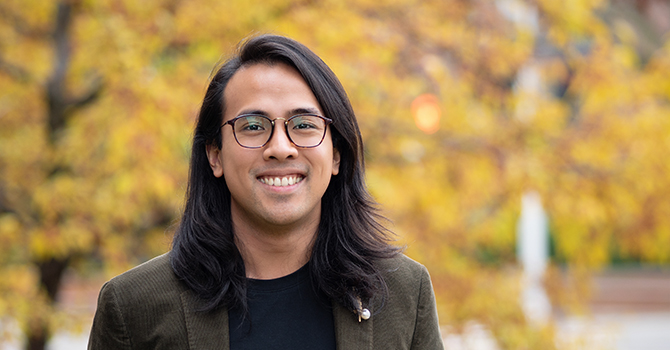Modeling Better Public Policy

Anton L.V. Avanceña
PhD Student in Health Services Organization and Policy
I was born and raised in the Philippines. Some of my family moved to the San Francisco Bay Area in 2005, and I followed in 2010. I am definitely in the field of public health because of my formative years growing up and experiences in the Philippines. In the Philippines, I witnessed and lived in communities with great health needs, and this continues to motivate me. I was pre-med as an undergrad but eventually realized public health was where I could have the greatest impact.
In the Philippines, I witnessed and lived in communities with great health needs, and this continues to motivate me.
I started my undergraduate studies in Ateneo de Manila University in the Philippines and finished my degree in public health at Santa Clara University in California. I earned a master's degree in Global Health Sciences and then worked for three years in the Malaria Elimination Initiative at the University of California, San Francisco. Michigan was an obvious choice for me for doctoral studies because of the rigorous health services research program, the school's enthusiastic, thoughtful mentoring, and the competitive funding package I was offered.
As a PhD student in the Health Services Organization and Policy program, part of the Health Management and Policy department, I am concentrating in operations research and decision sciences. Broadly speaking, I use modeling and simulation techniques—such as cost-effectiveness analyses—to understand the costs and benefits of various health policies and to improve efficiency in public health and health care.
I'm a recent grantee of the Robert Wood Johnson Foundation's Health Policy Research Scholars (HPRS) program, a nationally competitive program that often selects Michigan students. This leadership development opportunity is for second-year doctoral students from vulnerable populations and includes scholars from a wide variety of disciplines.
In resource-limited settings, equity and efficiency are goals that the health care system cannot afford to pursue separately.
I applied to the HPRS program because I think this interdisciplinary experience will help me apply my decision science research in ways that can also advance health equity. I know that efficient health policies and interventions can also be equity promoting. We have scarce resources for public health and health promotion, so as we work to advance health equity, it pays to do so efficiently—by weighing the relative costs and benefits of competing options.
In resource-limited settings like the Philippines, equity and efficiency are goals that the health care system cannot afford to pursue separately. Health disparities—particularly those resulting from differences in socioeconomic status—are stark, and efforts to narrow gaps will have to be cost-effective if the impact of limited health budgets is to maximized.
HPRS is structured well to help us develop leadership skills. Through weekly online classes and in-person meetings, we discuss topics central to our studies, like health equity concepts and policy-making processes in the US. Mentors are another important part of the HPRS program, which has connected me with several experts and practitioners in the field.
Simulating outcomes is well suited in situations where there is uncertainty or insufficient data, which is often where policy makers operate.
The program is helping me become a better health communicator, which is important for anyone working in policy. If I could translate one idea in a more effective way to policy makers, it would be to explain just how valuable modeling and simulation techniques can be to creating sound public policy. Models are not "black boxes" with mysterious inner workings resulting in biased recommendations. On the contrary, simulating outcomes is well suited in situations where there is uncertainty or insufficient data, which is often where policy makers operate.
I'm keeping my career options open but am currently focused on building an academic career. I really enjoy research and teaching. But I do dream of one day working in a policy-making body like the World Health Organization, the US Department of Health and Human Services, or even the Department of Health in the Philippines. I want to work wherever I can have the greatest impact.
